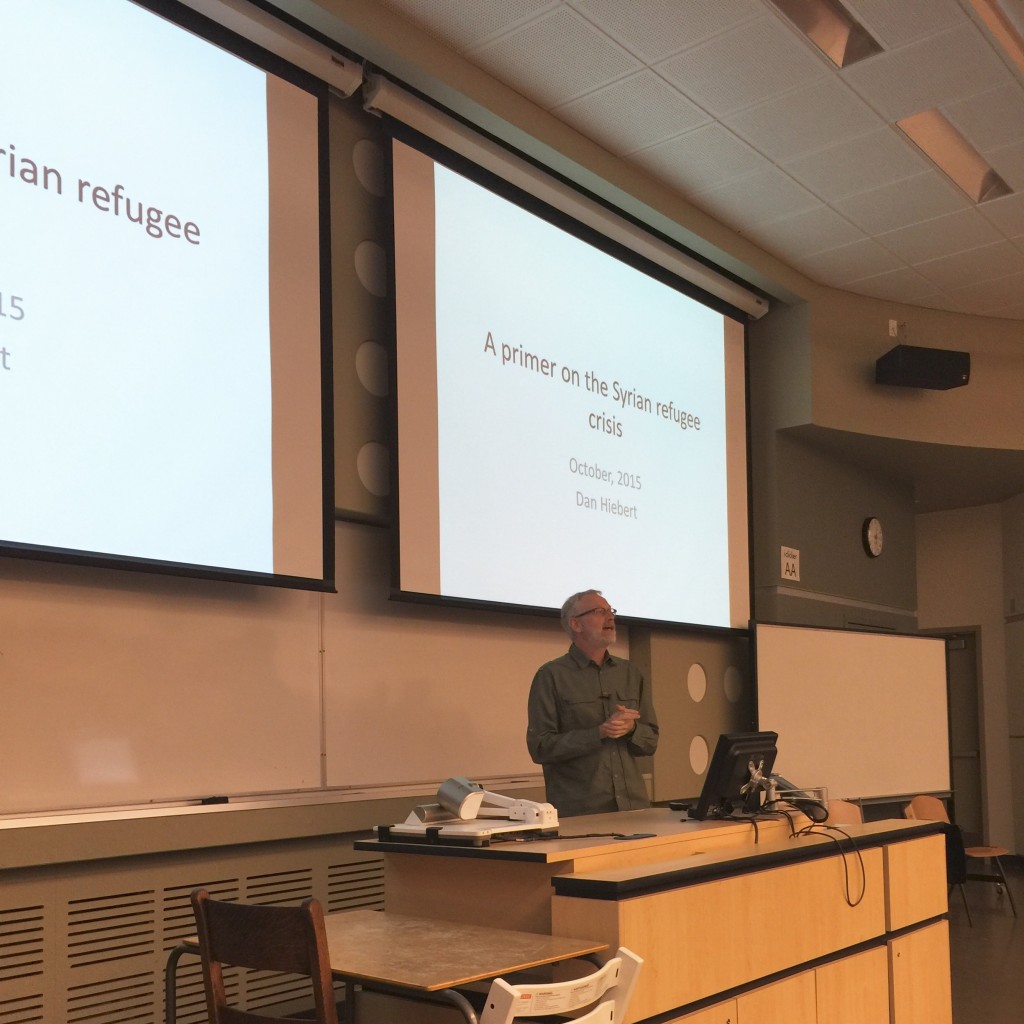On October 1st, Professor Dan Hiebert gave an introductory lecture on the Syrian Refugee Crisis and international responses so far. Over 80 members of the UBC community, as well as members of local NGOs and the City of Vancouver, were in attendance. Gathering data from various migration conferences, meetings with government officials from Canada, EU Countries, Turkey, the UK, and the United Arab Emirates, Prof. Hiebert discussed the responses various countries have had in the face of the Syrian refugee crisis.
Though Prof. Hiebert stressed that the talk was not about who’s responsible for the conflict in Syria, he did give a general understanding of the various different groups involved (the Assad regime, the Free Syrian Army funded by the West and other rebel groups) and that due to the external geopolitical tensions and internal animosities between groups, there is no end in sight of the Syrian Civil War. In the meantime, shifting boundaries and territories, and the danger to civilians have displaced 6-7 million people still residing in Syria.
In 2010, Syria had a population of 22 million people. 250,000 to 300,000 people have been killed since the civil war started in 2011; 1 million people have been injured; 5 million have fled the country while another 5-8 million are preparing to flee. Though the media have focused largely on refugees fleeing to Europe, a very small fraction (1 million) of the refugees have actually fled to Europe; the majority of refugees (4 million) have gone to their regional neighbours with Turkey taking the bulk at 2.2 million refugees. The Gulf States have also taken a large number of refugees but the total number is unclear as they are not signatories of the 1951 UN Refugee Convention.
Prof. Hiebert then used the case studies of Turkey and Germany as examples of how countries near and far have responded to the influx of refugees. As Syria’s neighbour to the north, and an applicant for membership of the EU, Turkey has the majority of Syrian refugees. Of the 2 million Syrian refugees that have fled to Turkey, nearly 300,000 are in refugee camps. The majority of refugees have gone into cities in search of better lives as they cannot work while living in refugee camps. Since the refugee crisis, 70,000 Syrians have been born in Turkey.
Turkey, with some financial aid from the EU, has spent $7.6 billion on the refugee crisis. When polling the public, 60% felt that it is their humanitarian obligation to help the Syrian refugees but 83% said they shouldn’t offer citizenship to them. These internal pressures are hardened by the EU’s insistence that they keep their eastern borders open while closing their western borders, making it more difficult for refugees to enter Europe. There are also borders/walls being built in Bulgaria, and between Serbia and Hungary.
Germany and Sweden are the only members of the EU that have offered permanent residency to refugees so far. Germany sees this influx of refugees as a kind of solution to their declining population and low birth rate. Though they expect around 800,000 refugees per year for this year and in the foreseeable future, they only have plans to allow approximately 350,000 per year to stay. In spite of these strict parameters, a huge number of civilians have volunteered to help refugees survive while waiting for asylum decisions.
The EU plans to relocate refugees across the Union to relieve the pressure on frontier nations such as Greece, Italy, and Hungary, but with the unending influx of refugees, governments have found it difficult to keep up with the demand. In Turkey today, a refugee claim may take as long as 5 years on the waiting list before being formally processed.
Prof. Hiebert ended the lecture with some reflections on the immensity of the situation. It is very likely that we have a major diaspora of millions forming as there seems to be no end in sight of the Syrian civil war. Regional countries are coping so far but there is a serious concern for the medium-long term well-being of both the host nations and the refugees.
Recap and photo by Mimi Yu
Edited by Professor Dan Hiebert



